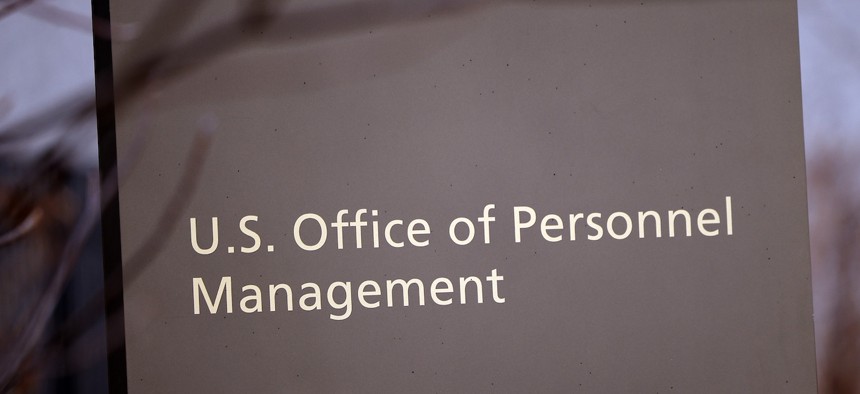
The last day for the public to comment on OPM’s proposed rule is June 7. Kevin Dietsch/Getty Images
Federal workforce advocates flood opposition to renewed Schedule F
With just a day remaining before the deadline to submit comments on the Trump administration’s proposed Schedule F regulations, the vast majority of more than 30,000 submissions were opposed to the measure.
With just a day remaining until the window to comment on the Trump administration’s proposal to reinstate Schedule F and strip tens and thousands of federal employees of their civil service protections, groups representing or otherwise advocating on behalf of federal workers have formally registered their opposition to the measure.
The Office of Personnel Management in April published proposed rules to revive President Trump’s abortive first-term effort to reclassify federal workers in “policy-related” roles outside of the competitive service, effectively making them at-will employees. Saturday marks the deadline for members of the public to provide input on the plan, since renamed Schedule Policy/Career.
OPM estimates that 50,000 federal workers ultimately will be impacted by the proposal, though experts warn that the actual figure could be much higher, based on reclassification plans both from Trump’s first crack at Schedule F and recent reporting from within agencies.
As of Friday afternoon, more than 30,000 comments had already been submitted, the vast majority of which appear opposed to OPM’s proposal.
The National Treasury Employees Union, which has sued to block Schedule Policy/Career, wrote in comments submitted last month that the plan jeopardizes the merit system that undergirds the entire federal civil service.
“Under OPM’s proposal, agencies would thus be able to engage in prohibited personnel practices against more employees without any repercussions,” wrote NTEU National President Doreen Greenwald. “Whistleblowers would have diminished protection and therefore would be less willing to disclose waste, fraud or abuse. Employees would be subject to political coercion without any effective remedy. And agencies would be able to hire employees based on nepotism instead of merit.”
And a coalition of more than 100 nonprofits and advocacy groups, led by Democracy Forward and Protect Democracy, filed comments opposed to the regulations Friday and warned the measure would undo more than a century’s worth of federal law aimed at protecting the federal workforce from politicization and favoritism.
“We, the undersigned organizations, write in strong opposition to the Office of Personnel Management’s proposed rule titled, ‘Improving Performance, Accountability and Responsiveness in the Civil Service,’” they wrote. “Contrary to its name, the proposed rule would severely undermine the career civil service that Congress has sought to protect and preserve for more than 140 years, beginning with the Pendleton Act of 1883 and as reaffirmed through the Civil Service Reform Act of 1978 and subsequent amendments.”
“The president cannot dismantle the safeguards of the federal civil service—which works for all Americans—just to install loyalists,” said Rob Shriver, former acting OPM director during the Biden administration and managing director of Democracy Forward for civil service issues. “The American people deserve a government led by independence, fairness and expertise, not fear and political retaliation."
And groups representing employees in jobs related to environmental issues warned that OPM’s plan would shatter employees’ ability to pursue science in government. Public Employees for Environmental Responsibility warned the rules could have a chilling effect on employees whose job is to inform policymakers.
“Statutory adverse action rights—the rights of civil servants to challenge removals from service, suspensions or demotions—allow civil servants to challenge removals from service, suspensions or demotions—allow civil servants to serve the nation without fear of political reprisal and agencies to rely on their continued service,” PEER wrote. “This is essential to the effective functioning of agencies; without adverse action protections, civil servants like scientists, forecasters and statisticians, who are not in policy rules, will be potentially transferred into such positions where they very likely will credibly fear retaliation if they deliver potentially bad news, whether it be agricultural production statistics, severe weather forecasts, economic trends, or the myriad other types of information that federal civil servants now deliver.”
And the Environmental Protection Network, a group of former Environmental Protection Agency workers, said the measure would effectively shear the distinction between political appointees tasked with designing policy and the career workers who provide the evidence to support that policy.
“Under OPM’s proposal, all of these people, from first-line staff up through the management positions that supervise the process, including the political appointee who makes the policy decision, would be considered ‘policy-determining or policy-making’ positions,” EPN wrote. “All of these career employees could be assigned to the proposed Schedule Policy/Career. This obliterates the distinction between the limited group of people who actually make or determine policy, and the much larger group of people charged with providing the background information and analyses needed by the ultimate decision-makers to finalize a particular policy, and those charged with then implementing it.”
How are these changes affecting you? Share your experience with us:
Erich Wagner: ewagner@govexec.com; Signal: ewagner.47
NEXT STORY: The evolution of telework in the federal government: A cautionary tale







